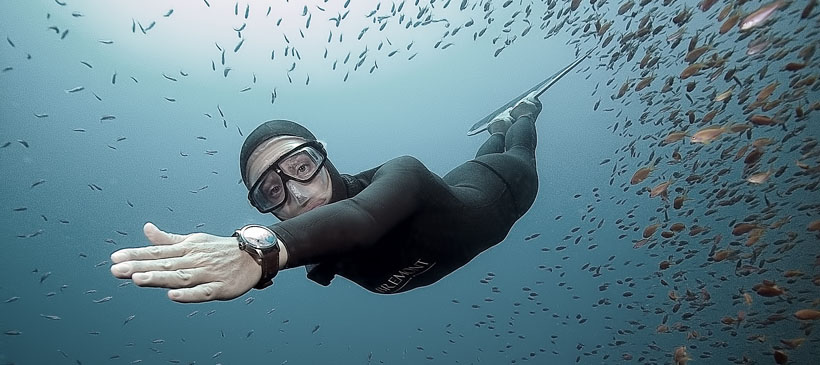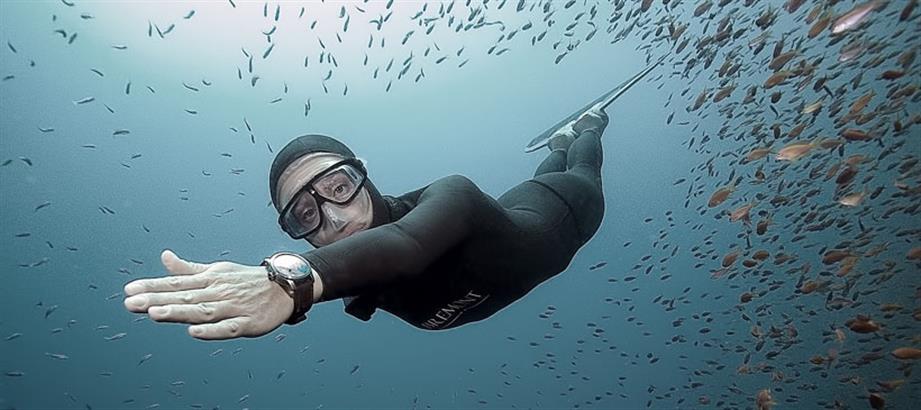POLLY CREED follows Sara Campbell’s awe-inspiring journey from PR girl to world-record breaking free-diver.
Standing before the audience at the Advaya Initiative Day, Sara Campbell seems an unlikely candidate for a record-breaking extreme athlete: she is tiny (4ft 11in) and in her mid-40s, with shawls of white fabric gathered around her shoulders, and glasses clasped in her hand. Indeed, everything about Campbell’s story is unlikely.
12 years ago, Sara Campbell hadn’t even heard of free-diving. She was living in London, whilst running her own PR company, and suffering with chronic pain. A year and a half later, she had set an unprecedented 11 British records and 3 world records for free-diving – widely considered to be the second most dangerous sport in the world (number one is sky diving off buildings).
The record-breaker stumbled across free-diving almost by accident. In December 2005, Campbell was facing a difficult Christmas; she was finding life in her one-bedroom flat in London increasingly tough and her sister, Polly, had just given birth to a baby, catalysing a personal crisis about her own lack of family or committed relationship. Impulsively, she decided to book a holiday to Dahab, an Egyptian tourist town, nestled on the edge of the Sinai Peninsula. She hoped that a short burst of Egyptian sunshine would offer some respite from the stresses and pain of her personal life back in London.

A few days into her holiday, Campbell decided to get up early and take a horse ride along the beach to the Blue Hole – a famous diving site. Here, she was greeted by an overriding sense of connection to the place: ‘it felt like somebody had lifted up the top of my brain and put a note inside that said, “This is home”’. Campbell took the bold decision to follow her intuition; two days after she landed back in London, she booked a flight back to Egypt and made plans to move her life there. She rented a flat in Dahab and set herself up as Kundalini yoga teacher (she had already been a part-time yoga teacher back in London), taking classes that focused on breathing technique. During these classes one of her pupils, a free-diver, noted Campbell’s extraordinary breath control and insisted that she should try free-diving. It took her almost another year of being settled by the Red Sea before Campbell finally gave in and tried the sport. She was instantly hooked and within 6 weeks she was being considered to take part in the World Championship, as part of the British team.

Although her lung capacity is 25% greater than the average for her size, Campbell’s aptitude is still astounding. Nicknamed ‘Mighty Mouse’, Campbell is frequently singled out as being exceptionally strong and able for her small frame. Still more amazing is the fact that, unlike her competitors, Sara Campbell doesn’t practise any conventional free-diving exercises, such as strength training or lactic acid tolerance training. Instead, she relies solely on the teachings of Kundalini yoga.
As the talk goes on, she begins to outline the source of her crystalline focus and discipline. According to Campbell, when she first began to dive, she was unaware that her approach and will-power differed from those around her. Indeed, she still viewed herself as a ‘ditsy blonde PR girl’. Nevertheless, as her teachers and competitors started to comment more and more on her unusual lack of fear and sense of focus, Campbell started to wonder if her yoga practice was, subconsciously, shaping her approach to diving. She decided to explore this further, introducing her yoga techniques to her dives in a conscious, deliberate manner. For instance, she used her yoga breathing to help overcome the infamous free-diver’s ‘mouth fill’. Mouth fill happens when a free-diver is diving so deep that the mounting pressure prevents air moving upwards out of the lungs into the mouth. This causes the ear drums to burst. Divers must, therefore, learn the art of naturally equalising: filling their mouths with air from the lungs and then locking their throats so that air cannot escape back down again into the lungs. Unlike, most of her rivals, Sara hasn’t had any ear problems whatsoever and describes her ears as ‘happy ears’.Alongside breathing, Campbell also used her Kundalini practice to reframe the free-diving experience; she no longer thought of herself as a human being trying to conquer the ocean. Instead, she tried to rekindle her body’s natural affinity with the water, remembering the fact that we are all roughly 60% water and that the human body has a primordial, evolutionary knowledge of surviving in water. She fine-tuned a process, by which she could connect with the water around her in a playful, inquisitive manner – she calls this engaging with her ‘inner dolphin’. Indeed, as we watch mesmeric footage of her braving a record-breaking 96m dive (exactly the same height as Big Ben), she looks remarkably like a dolphin: her silver wetsuit is iridescent as her body plummets deeper and deeper into the water, following the guide rope, her grey monofin pulsating against the inky water. She spends an excruciating 3 minutes 36 seconds under the water in total. Yet, she makes it look so easy – breaking through the surface of the water with a wide grinning across her tanned face. As she says, it does seem like this is where she belongs.
(try and hold your breath alongside Sara in this record breaking dive:)
Campbell’s approach not only reaped incredible results in her diving, as outlined above, but was also liberating for her own mental wellbeing: ‘I realised you don’t have to go through therapy, or weeks of feeling crappy – I could just jump in the water and feel brilliant. Even more so than meditating in a yoga room, there are no distractions. You don’t have cars passing, or phones ringing, or people making a noise in the next room, or dogs barking. It’s utter silence.’ This assertion encapsulates Sara Campbell’s overall philosophy. She believes strongly in the need for people to reconnect with their natural surroundings; to swim in fresh, cold water, or to feel the grass and mud between their toes. She argues that our connection with nature is pivotal in unlocking the ancient knowledge of the body and breaking down the barrier between mind and body. She draws on the example of rabbits to illustrate this: when the sun rises, rabbits don’t lie around and complain about waking up. Instead, they’re up and out, without even thinking about it. Likewise, they don’t think about how or why or when they want to have sex. Instead, they simply get on with mating.

Campbell’s techniques revolve around temporarily reverting back to this animalistic state, to help us to welcome instinct and intuition into our daily lives. Although Sara Campbell does run combined courses in free-diving and Kundalini yoga out in Egypt (for a sum that will make your student loan quiver with fright), she also emphasises that we already have all the ingredients we need for this in our bodies and our surroundings for free. Just taking our shoes off in a parks can contribute to reawakening the dormant memories and knowledge of our bodies. Whether it’s free-diving in a class (please don’t try this at home in the bath, she says), swimming, running or simply walking, she espouses getting into nature and tapping into a non-cerebral, physical state. We all have an inner-rabbit or an inner-dolphin, waiting to be unlocked.
Find out more about Sara, her practice, and her free-diving on her website Discover Your Depths.
This article is part of a series on Advaya: read about their day of talks and workshops on the relation between mind and body here.





